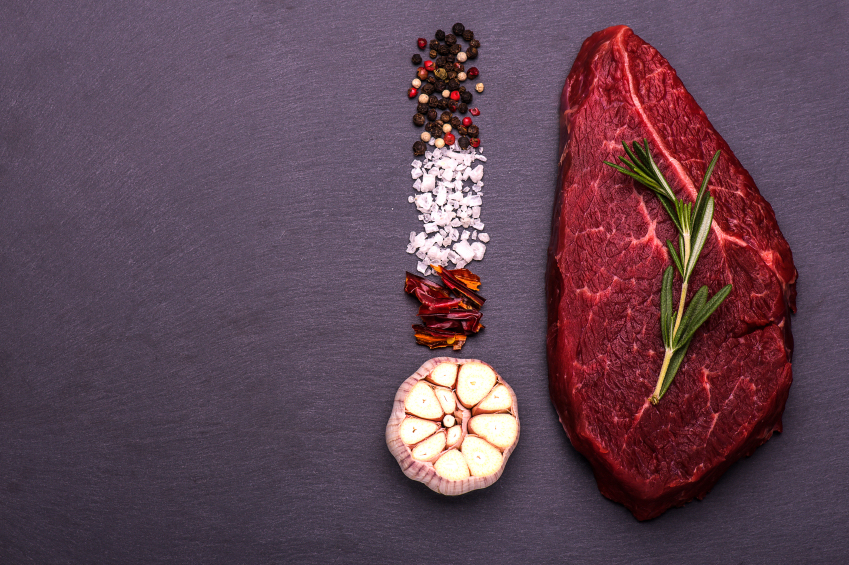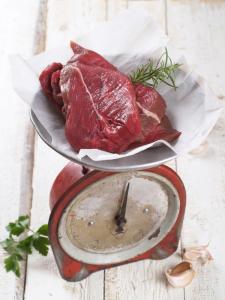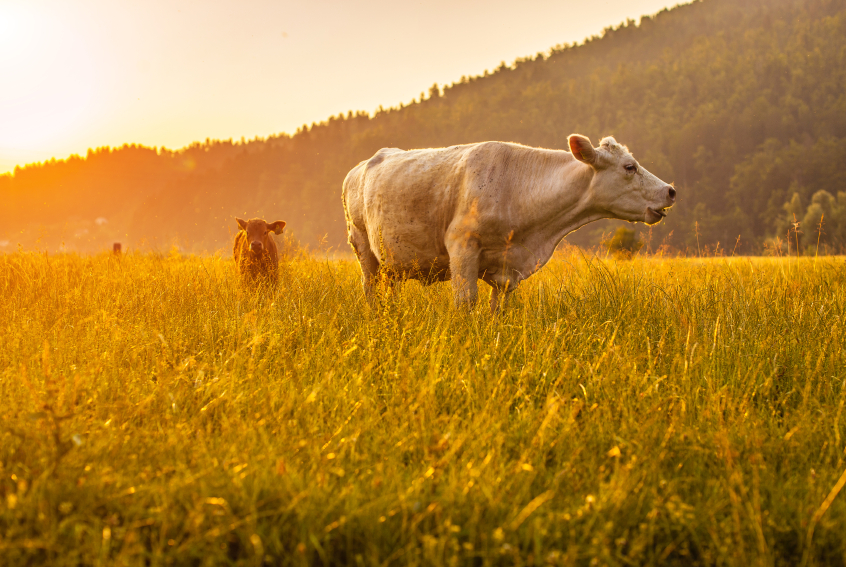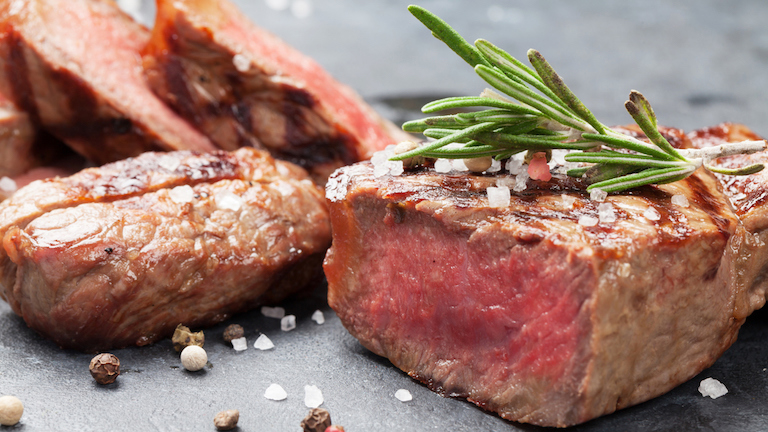‘Should I eat meat?’ is the big question on everyone’s lips, as a new study shows that even small amounts of red and processed meats can lead to early death. Here’s what the Britain’s leading scientists have to say on the matter.
Few would argue the pleasure of biting into a juicy sirloin.
However, studies have claimed eating red meat will fast track you to cancer, heart disease, obesity and an early death.
According to Britain’s former shadow farming secretary, vegan Kerry McCarthy, meat should be treated like tobacco in public health terms, with a campaign encouraging people to stop eating it.
Most recently, a new study evaluated the deaths of 7,900 individuals, and reviewed their diets over an 11 year period.
Of those individuals who consumed meat, 90 percent of them only ate about two ounces or less of red meat per day.
Even still, the study suggests that those who ate even a small amount of red and processed meat, increased their risk of early death from all causes, but especially cardiovascular diseases.
studies have claimed eating red meat will fast track you to cancer, heart disease, obesity and an early death
Conversely, the world’s oldest living person Susannah Mushatt, who turned 116 on July 6th recently told the New York Post she ate bacon every day.
We spoke to Britain’s leading nutritional experts about what to believe – and do – about meat.

Is it as bad for you as smoking?
‘That chicken wing you’re eating could be as deadly as a cigarette,’ screamed the press release about one study, published in the journal Cell Metabolism. It found people with diets high in animal proteins such as meat and cheese had a similar cancer risk to those that smoked 20 cigarettes a day.
Professor Tim Key, a Cancer Research UK scientist from the Cancer Epidemiology Unit at Oxford University who has been studying the links between cancer and diet on over 50,000 subjects for the last decade says: ‘It’s ridiculous and misleading to put meat in the same bracket as smoking, it’s highly unlikely the effect from meat is as bad as they say it is.’
Read more: 10 health myths even smart women believe
In fact, the researchers found few links between animal protein consumption and early death until they split the subjects into two groups, one between 50 and 65 and the other, over 65.
In the 50-65 age group, those that got a fifth or more of their calories from animal proteins such as red meat had a 74 per cent higher risk of death.
But what wasn’t reported widely was that in the older over 65s group, eating a diet high in protein including red meat had a protective effect.
The researchers hypothesised that protein controls the growth hormone IGF-1, which helps our bodies grow but has been linked to cancer. Levels of IGF-1 dramatically drop off after 65, leading to potential frailty and muscle loss.
The researchers hypothesised that protein controls the growth hormone IGF-1, which helps our bodies grow
‘While high-protein intake during middle age is harmful,’ the authors theorised, ‘it’s protective for older adults: those over 65 who ate a moderate- or high-protein diet were less susceptible to disease.’
‘It is plausible that higher levels of the RGF-1 hormone might be good for people entering older age and it’s an area scientists are currently working on, but it’s not yet established to be true,’ says Professor Key.
Will it put me in an early grave?
A number of large scale studies have linked non-meat eaters to longer lives and the Blue Zones project, which studies the diets of the world’s longest lived people such as the Japanese in Okinawa and Sardinians in Italy shows they thrive on plant-based, low or no-meat diets.
But there is heartening news for the meat lover. A large scale study, the European Prospective Investigation into Cancer (EPIC) that has followed over half a million people in 10 European countries for the last 12 years has found that small amounts of red meat – less than 80 grams a day – had no effect on mortality.
More than around 70 grams a day was associated with increased risk
In fact, Professor Key, who has worked on the British arm of the research, called EPIC Oxford, says this has been reinforced by the latest not yet published findings from the study.
‘We have looked at around 5000 deaths a month since our last results were published in 2009 and are still not seeing any difference between the lifespans of vegetarians and meat-eaters,’ he says.
But before you order that celebratory steak, there are caveats. ‘The key is in the amount of red meat consumed,’ says Professor Key. ‘More than around 70 grams a day was associated with increased risk.’
Despite the hype, our meat consumption has decreased by about 13 per cent since 2007 and the average Brit now consumes around 71 grams of red meat a day (the government recommendations are 70 grams a day).
Read More: Recipe – The 5 minute no-meat burger
And, it’s okay to save up your weekly portions and have two juicy 250 gram slices of rump. ‘As far as we know, that would probably be the same as having a small amount every day,’ Professor Key says.

you eat can result in better health.
But how much is too much?
Does it increase risk of heart attack?
‘Studies have linked higher intakes of red meat consumption to higher risk of heart disease’, says Victoria Taylor, chief dietitian with the British Heart Foundation (BHF).
In terms of preventing heart attack, eating less red meat – the BHF too recommends 70 grams a day – and more specifically a Mediterranean diet may be advisable, says Taylor.
A randomised controlled trial published in the New England Journal of Medicine on nearly 7500 men and women between 55 and 80 at increased risk of heart disease, found a lower incidence of heart attack in those that ate a Mediterranean-style diet with one portion of red meat (or less) a week and replaced it with white meat, fish, beans, lentils.
The lowest risk was found in those that added extra olive oil and nuts to their diets.
Are antibiotics and hormones a problem?
The use of hormones in British meat was outlawed in the 1980s (but still used widely in the US). And it’s over-use is contributing to the human antibiotic resistance problem, a link recently recognised by the World Health Organisation’s global report on antibiotic resistance, says Lee Holdstock of the Soil Association.
red meat consumption was strongly linked to the development of colorectal cancer – the fourth most common cancer in the UK
Routine antibiotic use is highest in intensively farmed pigs – 200 times that used in sheep – and often used in feed as a preventative measure, says Holdstock. So if you can afford only one organic meat, make it pork – organically reared animals are only treated with antibiotics as a last resort.
Still it’s not cheap and, according to the Argriculture and Meat Board, whenever antibiotics are used in non-organic farming, the treated animals are not allowed to go to slaughter for a set time, until any residues of the antibiotics clear from their bodies.
Is grass-fed really better?
‘Grass-fed animals walk around to eat and they get sunlight and a varied diet,’ says Rick Miller, state-registered dietitian and spokesperson for the British Dietetic Association.
‘We’ve examined meat from grass-fed animals compared to grain-fed and it has lower total body fat, and a higher proportion of healthy omega-3 fatty acids and monounsaturated fats.’

Does it cause cancer?
The World Cancer Research Fund (WCRF) concluded red meat consumption was strongly linked to the development of colorectal cancer – the fourth most common cancer in the UK – and that by eating no more than 500 grams a week of cooked beef, lamb or pork we could considerably lower our risk.
This could relate to the high saturated fat content in red meat, says Dr Rosalind Miller, nutrition scientist at the British Nutrition Foundation. ‘It might also be down to a substance called heme iron found naturally in red meat high levels of which have been shown to cause the formation of carcinogenic compounds’.
The more meat you eat, the more likely you are to be overweight or obese
The use of nitrates and nitrites to preserve meats – found in bacon, ham, sausages and other processed meats – can also lead to the formation of carcinogenic compounds in the gastrointestinal tract, Dr Miller explains.
There is also considerable proof that red meat eating – in particular the consumption of processed meats such as salami, sausage and ham – can also increase risk of stomach cancer which affects over 7000 people a year in the UK, says Professor Key.
Does it make you fat?
‘The more meat you eat, the more likely you are to be overweight or obese, ‘ says Rick Miller.

One study from Tufts University in Massachussetts analysed studies 120,000 people’s diets over 16 years and found large intakes of red meat were associated with weight gain while replacing red meat with yoghurt, seafood and nuts led to weight loss.
But go easy on off-the-shelf replacements such as Quorn, says Miller, ‘It’s highly processed,’ he says and research from the Consensus Action on Salt and Health has found meat replacements in general are often high in salt. ‘The best vegetarian proteins come from tempeh, tofu [soya-based] and beans,’ he says.
red meat always contains some fat and people often cook it in fat too which drives up the calorie content
Besides, a lean steak won’t make you fat, explains Dr Scott Harding a nutritional science lecturer at King’s College London. A piece of meat that’s pure protein without any fat will contain the same calories as it weighs in grams.
‘But red meat always contains some fat and people often cook it in fat too which is what drives up the calorie content,’ says Dr Harding – himself a meat lover – who concedes fat drives up the taste too.
Read More: 20 best weight loss tips EVER
‘I love good sausages and cured meats,’ he says. ‘So I reduce the portion size to 30 grams of a fatty Spanish sausage instead of 50 grams and make it into a stew that I bulk up with more vegetables. That way I still get the enjoyment and flavour of the fatty meat but I’m having less. Meat can fit into any diet – it’s the amount that matters.’
A version of this story first appeared in The Daily Telegraph
More Healthista Content:
Periods and exercise – How to sync your workout to your menstrual cycle
How much sugar are you REALLY eating? Food diaries revealed
How a tantric massage could boost your sex life
9 proven ways to prevent heart disease
Like this article? Sign up to our newsletter to get more articles like this delivered straight to your inbox.





















































